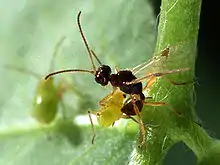| Euphorinae | |
|---|---|
 | |
| Peristenus digoneutis | |
| Scientific classification | |
| Domain: | Eukaryota |
| Kingdom: | Animalia |
| Phylum: | Arthropoda |
| Class: | Insecta |
| Order: | Hymenoptera |
| Family: | Braconidae |
| Subfamily: | Euphorinae Förster, 1862 |
| Tribes | |
|
Several, see text | |

The Euphorinae are a large subfamily of Braconidae parasitoid wasps. Some species have been used for biological pest control. They are sister group to the Meteorinae.
Description and distribution
Euphorines are small, usually dark colored wasps. They are non-cyclostomes. Euphorines are found worldwide.[1]
Biology
Euphorines are solitary or rarely gregarious koinobiont endoparasitoids. Unlike most other parasitoid wasps, Euphorinae have a broad host range and attack adult insects or nymphs of hemimetabolous insects.
Wasps of the tribe Dinocampini parasitize adult beetles.[2] Its four genera are Dinocampus Foerster, Ropalophorous Curtis, Centistina Enderlein, and Betelgeuse.[2]
Tribes
Representative tribes of Euphorinae are Centistini, Cosmophorini, Cryptoxilonini, Dinocampini, Euphorini, Helorimorphini, Meteorini, Myiocephalini, Oncometeorini, Perilitini, Proclithrophorini, Syntretini, and Tainitermini.
Genera
These 36 genera belong to the subfamily Euphorinae:
- Allurus Förster, 1862 c g
- Aridelus Marshall, 1887 c g b
- Bracteodes De Saeger, 1946 c g
- Centistes Haliday, 1835 c g
- Centistina Enderlein, 1912 c g
- Chrysopophthorus Goidanich, 1948 c g b
- Cosmophorus Ratzeburg, 1848 c g
- Cryptoxilos Viereck, 1911 c g b
- Dinocampus Förster, 1862 c g b
- Eadya Huddleston & Short, 1978 c g
- Ecclitura Kokujev, 1902 c g
- Elasmosoma Ruthe, 1858 c g b
- Euphoriella Ashmead, 1900 g b
- Euphorus Nees, 1834 g
- Kollasmosoma van Achterberg & Argaman, 1993 c g
- Leiophron Nees von Esenbeck, 1818 c g b
- Marshiella Shaw, 1985 c g
- Meteorus Haliday, 1835 c g b
- Microctonus Wesmael, 1835 c g b
- Myiocephalus Marshall, 1897 c g
- Neoneurus Haliday, 1838 c g b
- Perilitus Nees von Esenbeck, 1818 c g
- Peristenus Foerster, 1862 g b
- Proclithrophorus Tobias & Belokobylskij, 1981 c g
- Pygostolus Haliday c g b
- Rilipertus Haeselbarth, 1996 c g
- Ropalophorus Curtis, 1837 c g
- Spathicopis van Achterberg, 1977 c g
- Stenothremma Shaw, 1984 c g
- Streblocera Westwood, 1833 c g
- Syntretellus De Saeger, 1946 c g
- Syntretoriana Parrott, 1953 c g
- Syntretus Förster, 1862 c g b
- Townesilitus Haeselbarth & Loan, 1983 g b
- Wesmaelia Förster, 1862 c g
- Zele Curtis, 1832 c g
Data sources: i = ITIS,[3] c = Catalogue of Life,[4] g = GBIF,[5] b = Bugguide.net[6]
References
- ↑ Wharton, Robert A.; Marsh, Paul M.; Sharkey, Michael J. (1997). Manual of the New World Genera of the Family Braconidae (Hymenoptera) (PDF). Washington DC: The International Society of Hymenopterists. p. 69.
- 1 2 Shaw, Scott Richard (1988). "A new Mexican genus and species of Dinocampini with serrate antennae (Hymenoptera; Braconidae; Euphorinae)" (PDF). Psyche: A Journal of Entomology. 95: 289–298. doi:10.1155/1988/98545. Retrieved 23 June 2011.
- ↑ "ITIS, Integrated Taxonomic Information System". Retrieved 2018-05-15.
- ↑ "Catalogue of Life". Retrieved 2018-05-15.
- ↑ "GBIF". Retrieved 2018-05-15.
- ↑ "Euphorinae Subfamily Information". BugGuide.net. Retrieved 2018-05-15.